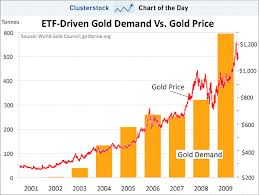Physical Gold v ETFs
 When considering investing in gold, investors are turning in greater numbers to ETFs. Certainly, these financial instruments can be traded easily and quickly just like any publicly traded company share on a stock exchange. But are ETFs really better for the investor? Here we compare investment into gold, such as bullion bars, and investment into an ETF that gives direct exposure to gold.
When considering investing in gold, investors are turning in greater numbers to ETFs. Certainly, these financial instruments can be traded easily and quickly just like any publicly traded company share on a stock exchange. But are ETFs really better for the investor? Here we compare investment into gold, such as bullion bars, and investment into an ETF that gives direct exposure to gold.
Buying and Selling
ETFs are traded just like publicly quoted shares, on an exchange and through a broker. They are dealt in throughout the trading periods of the stock exchange on which they are quoted, and an investment can be made in seconds.
Gold, on the other hand, can also be traded quickly online through a number of online dealers. However, if selling gold that is held in its physical form, then selling can be problematic. Gold prices are not as transparent as the prices of ETFs, and payment will have to wait until the gold sold has been delivered. This said, if the gold is held in an allocated account with a dealer then it can be sold immediately with payment usually within 24 hours.
Commission Payable
Buying and selling shares incurs commission payable to a broker. However, this commission is increasingly set at zero for many ETFs through many providers.
You will rarely be charged commission on purchases and sales of gold. But you will have to buy gold at a premium to the cash price, and sell it at a discount. This is a hidden cost of dealing in gold and usually larger than the spread between the bid and offer prices quoted on ETFs.
Holding/ Owning
Holding an ETF incurs no obvious cost. Shares are now paperless assets on most exchanges, and held on a register electronically. But, ETFs are managed funds, and these management fees often mean a charge of around 0.4% per annum. So ETF holders over the longer term will be disadvantaged by this charge.
Holding gold in a safety deposit box or at home costs money. At home, the initial installation charge needs to be taken into account. And if you hold your gold in a safety deposit box or a bank vault, there will be charges and fees levied. And don’t forget the cost of insuring gold held at home.
Delivering gold will also incur costs, such as the cost of postage or a courier service, and the cost of insuring against loss or theft during transit.
Security
Owning physical gold means that it is always available to be sold in an hour of need. No one can take it away – providing you have it in a safe at home. If you hold it in a safety deposit box, or at the vault of a dealer, it could be confiscated (for example in times of war).
Owning ETFs do not give you the right to physical gold. The shares are backed by gold, but that is held in vaults and could be confiscated in the same way that the gold you hold personally in a vault could be.
Holding gold yourself is, therefore, considered more protective than holding an ETF. You will always have the gold on hand and this will always have a value. ETFs, however, at least theoretically, could fall to zero should the unthinkable occur.
Privacy
Many investors hold gold at home because it is more private than holding shares on a public register. Wealth can be searched and assessed through share registers, but is far more difficult when that wealth is in the form of gold bars ion a private safe.
Gold is recognised the world over
ETFs can only be traded on the exchange on which they are registered. And then they have to be traded through a broker.
Gold, however, has a universal appeal and is easily recognised and tested. It can be bought and sold anywhere, at any time. Private deals can be struck, or gold sold through a high street dealer, or at auction, or online. The tradability of physical gold is far higher than that of ETFs.
Overall, what’s the right investment for you?
The advantages of gold over other investments are easy to see. It can be used to diversify a portfolio, is recognised as a store of wealth and hedge against inflation, and is a physical asset in a world dominated by ‘virtual assets’.
However, the selection of physical gold over an exposure given by owning an ETF is less clear cut. There are pros and cons of both. ETFs are easily traded, with little cost of owning. Physical gold can be problematic when buying and selling; though it can be sold anywhere in the world and will always have a value. Storing physical gold incurs costs that owning ETFs doesn’t.
Perhaps ETFs are best used for shorter term investments, or hedging purposes, where physical gold better diversifies an investment portfolio over a longer term.
Whatever your reasons for investing, and the expected term of investment, you should always take into account the effects of tax on an investment and any gains made before committing your hard earned cash. Tax laws change, and are different in different jurisdictions, but such consideration should form part of your research prior to buying or selling gold.